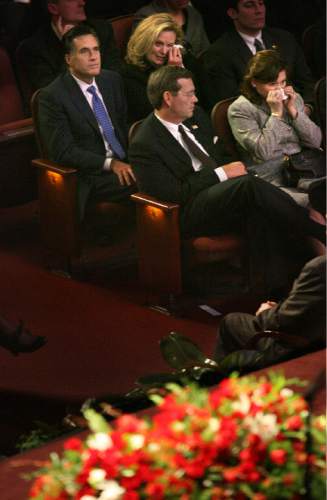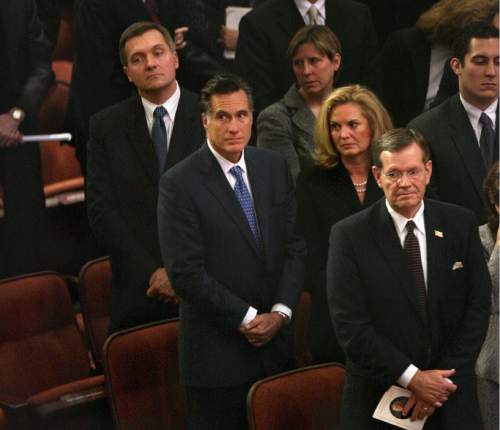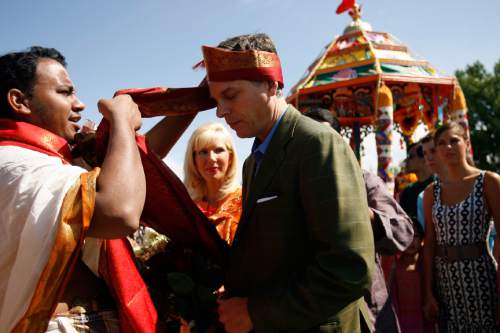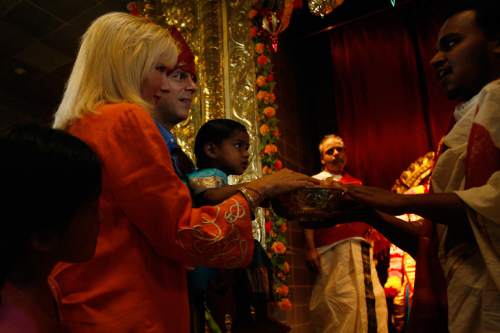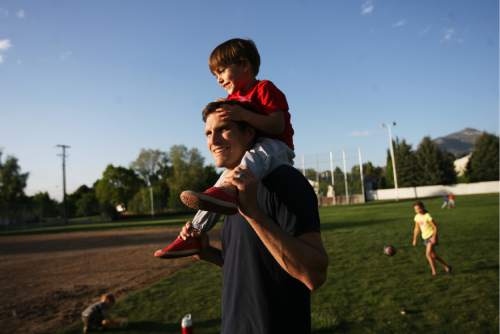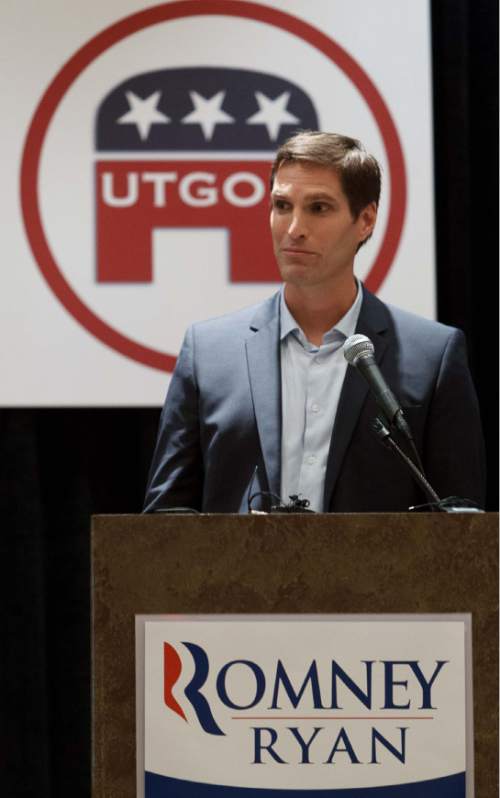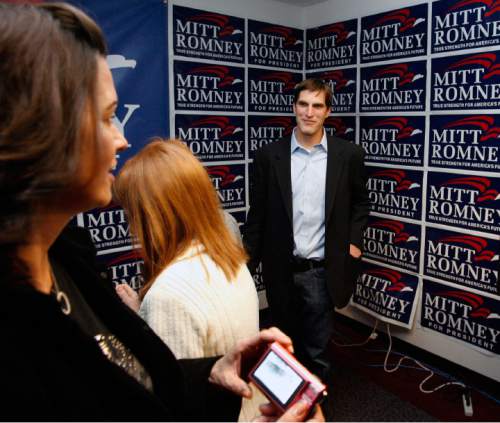This is an archived article that was published on sltrib.com in 2015, and information in the article may be outdated. It is provided only for personal research purposes and may not be reprinted.
On one side, we have the Romneys: Mormon Republicans who hold fast to their faith and stick to the political right.
On the other, we have the Huntsmans: Republicans who make room for many spiritual beliefs and lean left, right and center.
Which family, as the demographic maps shift away from organized religion and party allegiance, is better positioned politically to lead? Will future electoral contests in Utah and nationally favor a Romneyesque conservative, orthodox disciple or a Huntsman-like pan-religious bipartisan?
A new book by two Salt Lake Tribune political reporters spurs those questions and more, chronicling the politics and piety of these two families and their respective rises to prominence.
In "Mormon Rivals: The Romneys, the Huntsmans and the Pursuit of Power," Utah's former first lady notes that her family includes a blend of Roman Catholicism, Episcopalianism, Protestantism and what her husband, Jon Huntsman Jr., famously described as his "tough to define" Mormonism.
"We are not anti-Mormon or anti-anything, that is not how we are," Mary Kaye Huntsman says. "We gain from all the different aspects that make up our family."
The Huntsmans' multidenominational family life mirrors, to some extent, the multidimensional political career of Jon Huntsman Jr., who served as an ambassador to Republican and Democratic presidents and followed an unsuccessful bid for the GOP presidential nomination by helping to head the nonpartisan No Labels group.
Authors Matt Canham and Thomas Burr contrast the Huntsman family brand with that of Mitt Romney and his children. The Romneys share a familial and religious ancestry with the Huntsmans and, by all appearances, remain committed to The Church of Jesus Christ of Latter-day Saints.
Both former Republican governors, Huntsman and Romney faced off in the 2012 presidential campaign and are described in "Mormon Rivals" as the standard-bearers of two competing clans — the Montagues and Capulets of LDS politics.
"It's almost like they are trying to be king of the Mormons," an unidentified individual close to both families says in the book.
Political scientists who watch Mormon and Utah politics say the Romneys have the inside track within Utah, where party loyalty and organized religion remain strong.
But the Huntsmans' religiosity and politics increasingly match that of young Americans, suggesting members of that family could succeed in a general election — if they could navigate a party's nominating process.
"The Huntsman message just doesn't sell, even in New Hampshire," said Mormon political scientist David Campbell, director of the University of Notre Dame's Rooney Center for the Study of American Democracy.
"That's just because the Republican Party has moved too far right for a candidate like Huntsman to be successful."
—
The Utah effect • "Mormon Rivals" traces the often-parallel journeys of the two families, from patriarchs George Romney and Jon Huntsman Sr. to their famous sons and, potentially, their grandchildren.
The story weaves through private councils with LDS Church authorities in Salt Lake City, meetings with national leaders in Washington, D.C., and, from time to time, public bickering as the two families collide on the national stage.
Mitt Romney and, especially, Jon Huntsman Jr. could have more political contests in their futures, but speculation about prospective campaigns increasingly includes their offspring.
Several of Romney's children, particularly sons Tagg and Josh, are seen as potential politicians. And Abby Huntsman said she's open, under the right circumstances, to running for office, probably in Utah.
"If it was the right time and place," Abby Huntsman said in a recent interview, "and if it just felt right, I can't say no."
And her mix of fiscal conservatism, social moderation and nondenominational spirituality could play well — at least nationally.
Earlier this month, the Pew Research Center released its latest Religious Landscape Study, which showed a continued decline in the number of Christian Americans and a corresponding jump in the religiously unaffiliated, or "nones."
Other studies show Americans becoming politically unaffiliated as well, with the number of individuals who identify as independents climbing to a record 42 percent in 2014, according to Gallup.
In Utah, though, Republicans continue to dominate state politics. Voters in November elected an entirely GOP federal delegation and the second largest Republican majority in the state's House in the past 80 years.
But a recent report by the Utah Foundation showed that religious affiliation is slipping, even in the Beehive State, albeit at a slower pace than the rest of the country.
Utah's millennials — individuals born between 1980 and 2000 — are the least religious of any generational group in the state, with 30 percent claiming no religious affiliation, according to the report.
To Abby Huntsman, the trends away from rigid party and religious identification are more than passing fads and illustrate how her father was ahead of the times.
She said a shift to the political center is not only inevitable for Republicans, but also necessary for the party to attract new voters and win major races.
"I would say my dad is a perfect example of where the Republican Party will be once it wins a national election again," she said. "He was willing to stick with what he felt was best even if it meant losing an election."
Abby Huntsman has not shied away from criticizing extremism within the GOP — during her father's presidential campaign and now as co-host of "The Cycle" on MSNBC — but Campbell said the 2012 primaries showed that a moderate isn't what today's Republican base is seeking.
The Huntsmans' political brand of pragmatism and collaboration could have appeal in a future general election, Campbell said. But that assumes a world in which the party structure could be bypassed on the way to an electoral win.
"We don't live in that world. We live in a world where, realistically, you need to be nominated for whatever office by your party," Campbell said. "Given that, the Romneys probably have the edge."
But what about the world of tomorrow? Could the erosion of religious and political affiliation open up room for a candidate to galvanize the moderate, secularist vote?
Matthew Bowman, a Utah native and author of "The Mormon People: The Making of an American Faith," said that while American religiosity is becoming increasingly individual and eclectic, Utah Mormonism continues to be comparatively orthodox.
That disparity, he said, provides one more example of why a Huntsman candidacy might appeal more to an American electorate than a Utah one.
"Outside of Utah, I think what [Jon Huntsman Jr.] may be presenting is a kind of Mormonism that speaks to where a lot of American religionists are going," Bowman said. "His kind of Mormonism might be more familiar to people outside of Utah than those in it."
He said the Huntsman brand, one of self-defined religion and moderate politics, is in keeping with the attitudes of millennials. But there's no guarantee public opinion won't change over time.
"The difficult thing there," Bowman said, "is assuming the millennials of today will look exactly as they do 30 years from now."
—
Bloc party • Younger voters are also less likely to cast a ballot, according to Kelly Patterson, a senior scholar with the Center for the Study of Elections and Democracy at LDS Church-owned Brigham Young University.
Huntsman-type candidates could gain an edge among voters who are less politically and religiously devout, Patterson said, but they would lose the strength of an institutionalized support system.
"In most Utah contests for the foreseeable future, the advantage will be with a religious-base affiliation," Patterson said. "Voters need characteristics with which they can identify, and a candidate who can talk in terms voters recognize and in a language that is familiar to them." In short, Utah's Mormon Republicans want a candidate who walks and talks like a Mormon Republican.
Campbell said the increase in nonreligious Americans can be misleading, because those groups' voting habits tend to align with the left, who already are considered the less-religious side of the political spectrum.
The "nones," as the nonreligious often are dubbed, could potentially form a voting bloc, Campbell said, but it would likely be under the leadership of a liberal leader.
"They're out there; they're growing," he said. "They're increasingly vocal, politically, and I think it's inevitable that we'll find them coalescing somehow."
But what about a conservative or moderate candidate? Could a bipartisan, pan-religious politician such as Huntsman or one of his children be the spark that ignites the "nones"?
"Not as long as they keep identifying as Republicans," Campbell said.
Abby Huntsman said she leans right on the political spectrum, particularly on fiscal issues. She acknowledged many areas in which she disagrees with the GOP, including on same-sex marriage and climate science, but added that her views are shared by many younger voters whom the older generations can ignore only for so long.
"Millennials are only getting older," she said, "and they're going to take over the voting bloc."
Patterson said that both the Huntsman and Romney families have the money, networks and name recognition that would make Abby Huntsman or Josh Romney an intimidating opponent for a less-dynastic challenger.
He declined to speculate on who would have the upper hand if the two families faced each other again. But he added that the political fight would be an exciting one.
"If they were to ever run against each other," he said, "that would be a fun campaign to cover."
Where to get the book
O "Mormon Rivals: The Romneys, the Huntsmans and the Pursuit of Power," by Salt Lake Tribune political reporters Matt Canham and Thomas Burr, is available at bookstores and online in softcover and e-book formats. Go online for more information › mormonrivals.com. —
Authors on Monday's Trib Talk
Salt Lake Tribune reporters Matt Canham and Thomas Burr will join Jennifer Napier-Pearce on Monday at 12:15 p.m. to talk about their new book, "Mormon Rivals: The Romneys, the Huntsmans and the Pursuit of Power."
Watch this online video chat at sltrib.com. You can also join the discussion by sending questions and comments to the hashtag #TribTalk on Twitter and Google+ or texting 801-609-8059.


